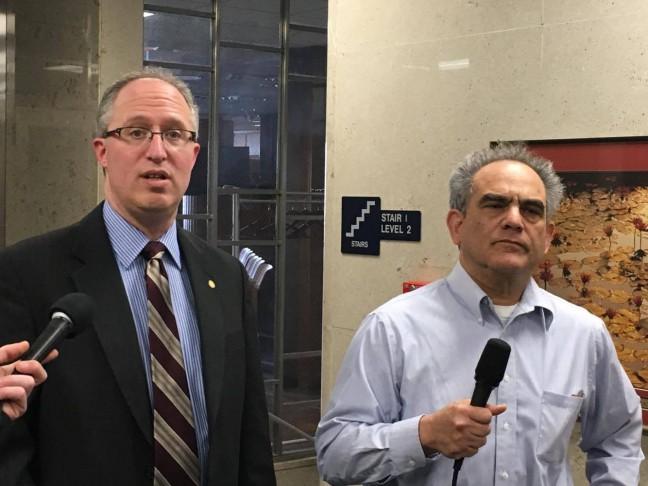Mayor Paul Soglin held a news conference Wednesday afternoon to address an allegedly secretive City Council initiative that could strip him of an appreciable degree of his official authority.
If passed, the “City Government Reform Initiative” would bar the mayor from making aldermanic committee appointments and serving a tie-breaking role on the Board of Estimates, diminishing the mayor’s influence on the budgeting process.
Soglin alleged the initiative was concealed from the mayor’s office until its official announcement Wednesday and the initiative’s authors are currently attempting to put it on a “rushed course for adoption.”
Though the initiative has been presented under the intention to redistribute power and eliminate certain unfair aspects of Madison’s government, Soglin said he believes the initiative is the result of pent-up resentment among council members regarding his stern fiscal policy.
Soglin said the City Council was in the midst of an “out-of-control spending spree” when he took office in 2011 and the policy of strict austerity he adopted in response has never been popular among council members.
“This is nothing more than their retaliation for my firmness in terms of responsible budgeting over the last decade,” Soglin said. “Look at the practices I inherited; look at the recklessness. I had to say no if I was going to keep the promises I made to the people of the city.”
The authors’ rationale in pushing this initiative is that Madison’s government does not incorporate the fair and even checks and balances that exist in most American governing bodies between executive and legislative branches of government. They assert that the mayor is afforded too much power over the council and suggest that the city government should operate in the same legislative fashion as the federal government.
Soglin rebutted this claim, stating the city of Madison has a unicameral legislature and that the federal model the authors propose would not work.
“They’ve turned to a model that is not appropriate because this is a unicameral legislature, not a two-house legislature,” Soglin said.
Soglin also condemned the initiative’s secret origins and alleged lack of public transparency.
The mayor’s news conference ended on a pointed note as he addressed questions about future relations between the mayor’s office and the City Council.
“I’m not interested in playing a game where children play in the street or play with matches because they think it’s all right,” Soglin said.
The initiative’s two primary authors, Ald. David Ahrens, District 15, and Ald. Mark Clear, District 19, held their own news conference immediately after Soglin’s to present their own perspective.
Responding to each of the mayor’s claims, Ahrens and Clear clarified the aims of their initiative.
“The purpose of our initiative is to both rebalance power — give local communities a greater share and sense of power — and make the budget and legislative processes more fair,” Ahrens said.
Clear said this proposal is by no means radical. In fact, Madison is the only city in the state that operates its government in this purportedly lopsided fashion.
In addition, Ahrens said legislative processes also work this way at the county level, the state level and the federal level, making Madison’s particular legislative paradigm quite the anomaly.
“What this reform really does is bring us more in line with the way that every other Wisconsin city works,” Clear said. “This process works in every other city in Wisconsin, so there’s no reason why it wouldn’t work here as well.”
Responding to the mayor’s implication the financially “reckless” City Council cannot be given full-reign in budgeting matters, Clear said the council is already responsible for a great deal of Madison’s budgeting processes.
Clear also rebuked the mayor for his open expression of his distrust of the council.
“I think what you heard in the mayor’s statement was a fundamental lack of trust in the council, and it’s pretty concerning that the council can’t be trusted to manage the budget process,” Clear said. “But actually, we manage a large portion of the budget process already.”
Ahrens and Clear denied Soglin’s claims of secrecy and rushed adoption, asserting that the mayor would not be entirely disenfranchised in budgeting matters. He would still be permitted to write the budget and chair the City Council during budgeting meetings.
The authors said the mayor’s appointment of the Board of Estimates’ members, chairing of the committee and composition of the legislation it deliberates on constitutes an “overstep” of control and their concerns do not stem from some petty dissatisfaction with Soglin’s policy.
“The basic premise here is that the council should be able to run its own house and let the mayor run his,” Ahrens said. “The picture of the mayor being the only adult in the room and everyone else is just spending like crazy is a mischaracterization of the facts.”












